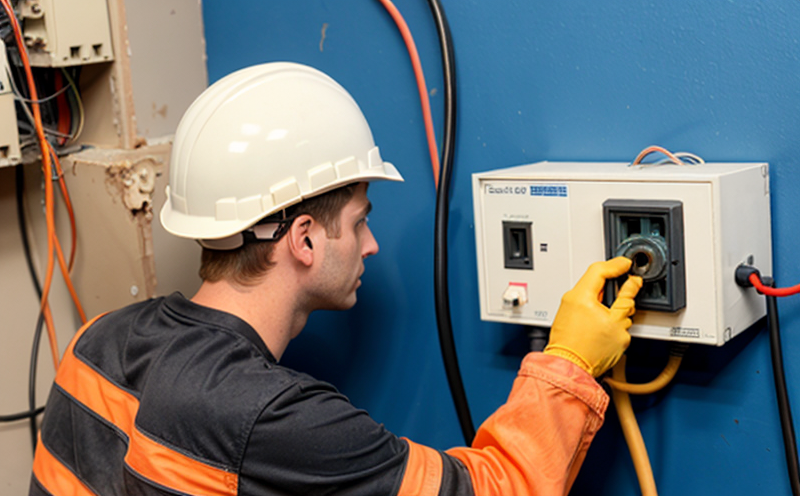IEC 60601-1 Battery Thermal Runaway Protection Testing
The International Electrotechnical Commission (IEC) Standard IEC 60601-1 provides essential guidelines for the safety of medical devices. One critical aspect covered by this standard is the prevention of battery thermal runaway, a phenomenon where excessive heat can cause a rapid increase in temperature leading to potential device failure and risks to patients or users. Our service focuses on ensuring that batteries used in medical devices comply with these stringent requirements.
Thermal runaway can lead to catastrophic failures, including fires, explosions, and other hazardous events. By adhering to the IEC 60601-1 standard, we aim to eliminate such risks through robust testing methodologies. Our team of experts ensures that your devices meet not only the minimum requirements but also exceed them in terms of safety.
The process begins with a thorough review of the device design and specifications to identify potential thermal hazards. This involves understanding how different components interact under various operating conditions, especially during overcharging or short-circuit scenarios. Once identified, we simulate these conditions using controlled environments that mimic real-world use cases.
During testing, we employ advanced instrumentation capable of detecting even the slightest changes in temperature indicative of impending thermal runaway. These instruments include high-precision thermocouples, data loggers, and specialized software for continuous monitoring throughout the test duration. We also utilize sophisticated calorimeters to measure heat release rates accurately.
The testing protocol is designed to be comprehensive yet reproducible, allowing us to compare results across multiple batches or iterations of your product. This ensures consistent performance over time, which is crucial given the dynamic nature of battery technology. Our experienced engineers analyze all collected data meticulously before issuing final reports detailing any non-compliances along with recommended corrective actions.
Compliance with IEC 60601-1 standards not only protects end-users but also enhances brand reputation by demonstrating a commitment to safety and quality. Moreover, successful completion of these tests can significantly reduce the risk of product recalls, legal disputes, and associated costs. It also opens up new market opportunities, particularly in regulated markets like Europe where stringent regulations apply.
In summary, our IEC 60601-1 Battery Thermal Runaway Protection Testing service offers comprehensive solutions tailored to meet the unique needs of medical device manufacturers. From initial design reviews through final production validation, we provide end-to-end support ensuring your products not only comply with international standards but also set new benchmarks for safety and reliability.
Applied Standards
| Standard | Description |
|---|---|
| IEC 60601-1 | International standard for the safety of medical electrical equipment. |
| IEC 62368-1 | Standard addressing electrical and electronic products including batteries. |
The application of these standards ensures that our testing aligns with global best practices, providing confidence that your devices will perform reliably under all expected conditions. Compliance with IEC 60601-1 specifically addresses the prevention of battery thermal runaway by specifying criteria for battery protection mechanisms.
Additionally, adherence to IEC 62368-1 helps ensure compatibility across different systems while addressing unique hazards associated with portable and mobile devices powered by batteries. Together, these standards form a robust framework upon which we base our testing procedures.
Scope and Methodology
| Method | Description |
|---|---|
| Battery Overcharge Simulation | Recreating scenarios where batteries are subjected to prolonged charging beyond normal limits. |
| Short Circuit Testing | Evaluating how devices react when a short circuit occurs within the battery assembly. |
| Thermal Cycling | Subjecting batteries to repeated cycles of heating and cooling to assess durability and stability. |
The scope encompasses both standalone batteries as well as integrated units within medical devices. We conduct tests on various types of batteries commonly found in these applications, such as lithium-ion (Li-ion), nickel-metal hydride (NiMH), and others specified by your design.
Our methodology involves several key steps: first, we review the device documentation to understand its intended use and potential risks. Next, we select appropriate test methods based on this information, ensuring they cover all relevant aspects of thermal safety. During testing, we closely monitor each parameter using state-of-the-art equipment calibrated according to international standards.
After completing all necessary tests, our engineers analyze the collected data meticulously. Any deviations from acceptable limits are recorded and discussed with you in detail, along with recommendations for improvements where needed. Finally, comprehensive reports are generated summarizing findings and conclusions drawn from the test results.
Quality and Reliability Assurance
We pride ourselves on delivering consistent, high-quality services that exceed expectations set by industry benchmarks. Our commitment to excellence is reflected in our rigorous quality assurance processes which encompass every aspect of our operations from initial consultation through final reporting.
The process starts with a detailed intake form where we gather all necessary information about your project including specifications, regulatory requirements, and any specific concerns you may have. Based on this input, our team develops customized test plans tailored specifically to your needs ensuring that no detail is overlooked.
Throughout the testing phase, we maintain strict adherence to internationally recognized standards like IEC 60601-1 and others relevant to your device type. Our laboratories are equipped with cutting-edge tools and technologies allowing precise measurements and accurate data recording. Continuous training of our staff ensures they stay updated on latest trends and developments within their field.
Once testing is complete, thorough analysis follows using advanced software packages designed specifically for medical device evaluation. Any anomalies detected during tests are thoroughly investigated before being documented in final reports accompanied by recommendations for addressing identified issues.
To further enhance reliability, we offer post-test support services including assistance with regulatory submissions and advice on how best to incorporate findings into ongoing product development cycles. By partnering with us early in your project lifecycle, you gain access to expert guidance that helps ensure compliance throughout the entire process.





